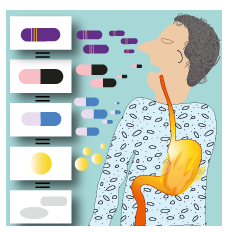This is a guest post from the UBC Therapeutics Initiative.
 Therapeutics letter #99 - Comparative effectiveness of proton pump inhibitors
Therapeutics letter #99 - Comparative effectiveness of proton pump inhibitors
In six previous Therapeutics Letters, we reported information about the benefits and harms of different proton pump inhibitors (PPIs).These drugs work by irreversibly inhibiting gastric H+K+ ATPase (the proton pump) in the stomach. They inhibit both basal and stimulated acid secretion and are used in a number of clinical settings: gastroesophageal reflux disease (GERD), reflux esophagitis, peptic ulcer disease (PUD), and symptoms associated with stomach acid such as heartburn and acid indigestion.
We have conducted two systematic reviews to compare the efficacy and safety of different PPIs: one in patients with symptomatic GERD and one in patients with PUD.
Read the full letter to learn more about the survey: http://www.ti.ubc.ca/2016/06/28/99-comparative-effectiveness-proton-pump-inhibitors/

 Therapeutics letter #98 - Does SPRINT change our approach to blood pressure targets?
Therapeutics letter #98 - Does SPRINT change our approach to blood pressure targets?
In Therapeutics Letter #82 - Clinical Hypertension Pearls from The Cochrane Library, we summarized 5 Cochrane systematic reviews about hypertension. The conclusion of the evidence from the Cochrane systematic review Treatment blood pressure targets for hypertension was that “treating patients to lower than standard blood pressure (BP) targets (≤ 140-160/90-100 mmHg) does not reduce mortality or morbidity.”
In September 2015, Systolic blood PRessure INtervention Trial (SPRINT) added a new trial that studied BP targets. It was stopped early for benefit and results were published in November 2015. It is important to incorporate the findings from SPRINT along with all other BP target trials. Therapeutics Letter #98 - Does SPRINT change our approach to blood pressure targets? takes SPRINT and puts it into the context with the previous Cochrane systematic review and concludes that "at the present time, lower BP targets (≤ 135/85 mmHg) have not been demonstrated to reduce mortality or total serious adverse events as compared with standard BP targets (≤ 140-160/90-100 mmHg)."
To understand why, read the full letter: http://www.ti.ubc.ca/2016/04/07/98-sprint-change-approach-blood-pressure-targets/
How are these letters developed?
Considerable research and collaborative work goes into developing the Therapeutics Letters. The process involves a literature review and development of the message by different working groups of the Therapeutics Initiative. A draft of the letter is reviewed by specialists who are expert in the particular therapeutic area and members of the Scientific Information and Education Committee.
 Learn more
Learn more
The Therapeutics Initiative was established in 1994 by the Department of Pharmacology and Therapeutics in cooperation with the Department of Family Practice at The University of British Columbia with its mission to provide pharmacists, physicians, nurses, and allied health professionals with up-to-date, evidence-based, practical information on drug therapy. Visit www.ti.ubc.ca or follow them on Twitter @Drug_Evidence to learn more.
- UBC, Guest Post, Therapeutics Letter

 Share
Share


